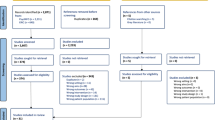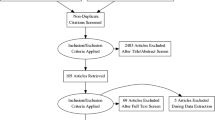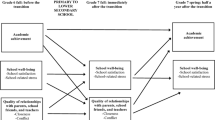Abstract
Students with ADHD struggle substantially at the post-secondary transition. Yet, no empirical work identifies school-based intervention targets that specifically prepare graduating students for adjustment to this new phase of life. This study is a preliminary investigation of factors that promote success for students with ADHD during the post-secondary transition. Using qualitative methods, 25 in-depth interviews were conducted with 13 young adults with ADHD (age 18–21) and 12 parents of young adults with ADHD. Informants offered their perspectives of what factors were critical to post-secondary success and how (i.e., by what mechanisms) these factors influence young adult functioning. Twenty macrothemes were identified under three a priori categories: motivational, skills, and environmental factors. Two macrothemes outside of these categories were identified post hoc. Motivation and self-control difficulties were identified as the most commonly impairing deficits. Factors that enhanced and undermined these deficits were identified by parents and young adults. Implications for intervention are discussed.
Similar content being viewed by others
References
Abba, N., Chadwick, P., & Stevenson, C. (2008). Responding mindfully to distressing psychosis: A grounded theory analysis. Psychotherapy Research, 18(1), 77–87.
Altszuler, A. R., Page, T. F., Gnagy, E. M., Coxe, S., Arrieta, A., Molina, B. S., et al. (2016). Financial dependence of young adults with childhood ADHD. Journal of Abnormal Child Psychology, 44(6), 1217–1229.
Anastopoulos, A. D., King, K. A., Besecker, L. H., O’Rourke, S. R., Bray, A. C., & Supple, A. J. (2018). Cognitive-behavioral therapy for college students with ADHD: Temporal stability of improvements in functioning following active treatment. Journal of Attention Disorders. https://doi.org/10.1177/1087054717749932.
Antshel, K. M., Faraone, S. V., & Gordon, M. (2012). Cognitive behavioral treatment outcomes in adolescent ADHD. Focus, 10(3), 334–345.
Arnett, J. J. (2000). Emerging adulthood: A theory of development from the late teens through the twenties. American Psychologist, 55(5), 469–480.
Barbaresi, W., Katusic, S., Colligan, R., Weaver, A., & Jacobsen, S. (2007). Long-term school outcomes for children with attention-deficit/hyperactivity disorder: A population-based perspective. Journal of Developmental and Behavioral Pediatrics, 28, 265–273.
Barkley, R., Fischer, M., Smallish, L., & Fletcher, K. (2006). Young adult outcome of hyperactive children: Adaptive functioning in major life activities. Journal of the American Academy of Child and Adolescent Psychiatry, 45, 192–202.
Barkley, R. A., & Murphy, K. R. (2010). Impairment in occupational functioning and adult ADHD: The predictive utility of executive function (EF) ratings versus EF tests. Archives of clinical neuropsychology, 25(3), 157–173.
Barkley, R. A., Murphy, K. R., & Fischer, M. (2008). ADHD in adults: What the science says. New York: Guilford Press.
Barron, K. E., Evans, S. W., Baranik, L. E., Serpell, Z. N., & Buvinger, E. (2006). Achievement goals of students with ADHD. Learning Disability Quarterly, 29(3), 137–158.
Bovier, P. A., Chamot, E., & Perneger, T. V. (2004). Perceived stress, internal resources, and social support as determinants of mental health among young adults. Quality of Life Research, 13, 161–170.
Boyer, B. E., Geurts, H. M., Prins, P. J., & Van der Oord, S. (2015). Two novel CBTs for adolescents with ADHD: the value of planning skills. European Child and Adolescent Psychiatry, 24, 1075–1090.
Castellanos, F. X., Sonuga-Barke, E. J., Milham, M. P., & Tannock, R. (2006). Characterizing cognition in ADHD: Beyond executive dysfunction. Trends in Cognitive Sciences, 10, 117–123.
Charmaz, K. (2009). Shifting the grounds: Grounded theory in the 21st century. JM Morse et al. (2009). Developing grounded theory: The second generation, 125–140.
Charmaz, K. (2014). Constructing grounded theory. Thousand Oaks, CA: Sage.
Chemers, M. M., Hu, L. T., & Garcia, B. F. (2001). Academic self-efficacy and first year college student performance and adjustment. Journal of Educational Psychology, 93, 55.
Cheung, K. K., Wong, I. C., Ip, P., Chan, P. K., Lin, C. H., Wong, L. Y., et al. (2015). Experiences of adolescents and young adults with ADHD in Hong Kong: Treatment services and clinical management. BMC Psychiatry, 15, 95.
Cobb, S. (1976). Social support as a moderator of life stress. Psychosomatic Medicine, 38, 300–314.
Creswell, J. W. (1998). Qualitative inquiry and research design: Choosing among five traditions. Thousand Oaks, CA: Sage.
DuPaul, G. J., McGoey, K. E., Eckert, T. L., & VanBrakle, J. (2001). Preschool children with attention-deficit/hyperactivity disorder: Impairments in behavioral, social, and school functioning. Journal of the American Academy of Child and Adolescent Psychiatry, 40, 508–515.
Dvorsky, M. R., & Langberg, J. M. (2014). Predicting impairment in college students with ADHD: The role of executive functions. Journal of Attention Disorders. https://doi.org/10.1177/1087054714548037.
Elliott, T. R., Godshall, F., Shrout, J. R., & Witty, T. E. (1990). Problem-solving appraisal, self-reported study habits, and performance of academically at-risk college students. Journal of Counseling Psychology, 37, 203.
Evans, S. W., Schultz, B. K., DeMars, C. E., & Davis, H. (2011). Effectiveness of the challenging horizons after-school program for young adolescents with ADHD. Behavior Therapy, 42, 462–474.
Fabiano, G. A., Pelham, W. E., Coles, E. K., Gnagy, E. M., Chronis-Tuscano, A., & O’Connor, B. C. (2009). A meta-analysis of behavioral treatments for attention-deficit/hyperactivity disorder. Clinical Psychology Review, 29, 129–140.
Fabiano, G. A., Pelham, W., Waschbusch, D., Gnagy, E., Lahey, B. B., Chronis, A., et al. (2006). A practical measure of impairment: Psychometric properties of the impairment rating scale in samples of children with attention deficit hyperactivity disorder and two school-based samples. Journal of Clinical Child and Adolescent Psychology, 35, 369–385.
Gawrilow, C., Morgenroth, K., Schultz, R., Oettingen, G., & Gollwitzer, P. M. (2013). Mental contrasting with implementation intentions enhances self-regulation of goal pursuit in schoolchildren at risk for ADHD. Motivation and Emotion, 37, 134–145.
Gerdes, H., & Mallinckrodt, B. (1994). Emotional, social, and academic adjustment of college students: A longitudinal study of retention. Journal of Counseling & Development, 72, 281–288.
Glaser, B. G. (1978). Theoretical sensitivity. Mill Valley, CA: Sociology Press.
Gollwitzer, P. M., & Brandstätter, V. (1997). Implementation intentions and effective goal pursuit. Journal of Personality and Social Psychology, 73, 186.
Gut, J., Heckmann, C., Meyer, C., Schmid, M., & Grob, A. (2012). Language skills, mathematical thinking, and achievement motivation in children with ADHD, disruptive behavior disorders, and normal controls. Learning and individual Differences, 22, 375–379.
Halperin, J. M., Trampush, J. W., Miller, C. J., Marks, D. J., & Newcorn, J. H. (2008). Neuropsychological outcome in adolescents/young adults with childhood ADHD: Profiles of persisters, remitters and controls. Journal of Child Psychology and Psychiatry, 49, 958–966.
Hechtman, L. (1999). Predictors of long-term outcome in children with attention-deficit/hyperactivity disorder. Pediatric Clinics of North America, 46, 1039–1052.
Hechtman, L., Swanson, J. M., Sibley, M. H., Stehli, A., Owens, E. B., & Abikoff, H. B. (2016). Functional adult outcomes 16 years after childhood diagnosis of attention-deficit/hyperactivity disorder: MTA results. Journal of the American Academy of Child and Adolescent Psychiatry, 55, 945–952.
Hoza, B. (2007). Peer functioning in children with ADHD. Journal of Pediatric Psychology, 32, 655–663.
Jarrett, M. (2016). Attention-deficit/hyperactivity disorder symptoms, anxiety symptoms, and executive functioning in emerging adults. Psychological Assessment, 28, 245.
Jensen, P. S., Mrazek, D., Knapp, P. K., Steinberg, L., Pfeffer, C., Schowalter, J., et al. (1997). Evolution and revolution in child psychiatry: ADHD as a disorder of adaptation. Journal of the American Academy of Child and Adolescent Psychiatry, 36, 1672–1681.
Johnston, C., & Mash, E. J. (2001). Families of children with attention-deficit/hyperactivity disorder: Review and recommendations for future research. Clinical Child and Family Psychology Review, 4, 183–207.
Judge, T. A., & Bono, J. E. (2001). Relationship of core self-evaluations traits—Self-esteem, generalized self-efficacy, locus of control, and emotional stability—With job satisfaction and job performance: A meta-analysis. Journal of Applied Psychology, 86, 80.
Kent, K. M., Pelham, W. E., Molina, B. S. G., Sibley, M. H., Waschbusch, D. A., Yu, J., et al. (2011). The academic experience of male high school students with ADHD. Journal of Abnormal Child Psychology, 39, 451–462.
Kern, R. M., Rasmussen, P. R., Byrd, S. L., & Wittschen, L. K. (1999). Lifestyle, personality, and attention deficit hyperactivity disorder in young adults. Individual Psychology, 55, 186.
Kessler, R. C., Price, R. H., & Wortman, C. B. (1985). Social factors in psychopathology: Stress, social support, and coping processes. Annual Review of Psychology, 36(1), 531–572.
Kuriyan, A. B., Pelham, W. E., Molina, B. S. G., Daniel, W. A., Gnagy, E. M., Sibley, M. H., et al. (2013). Young adult educational and vocational outcomes of children diagnosed with ADHD. Journal of Abnormal Child Psychology, 41(1), 27–41.
Langberg, J. M., Smith, Z. R., Dvorsky, M. R., Molitor, S. J., Bourchtein, E., Eddy, L. D., & et al. (2017). Factor structure and predictive validity of a homework motivation measure for use with middle school students with attention-deficit hyperactivity disorder. School Psychology Quarterly. https://doi.org/10.1037/spq0000219.
Lefler, E. K., Sacchetti, G. M., & Del Carlo, D. I. (2016). ADHD in college: A qualitative analysis. ADHD Attention Deficit and Hyperactivity Disorders, 8, 79–93.
Mannuzza, S., Klein, R. G., Bessler, A., Malloy, P., & Hynes, M. E. (1997). Educational and occupational outcome of hyperactive boys grown up. Journal of the American Academy of Child and Adolescent Psychiatry, 36, 1222–1227.
Mannuzza, S., Klein, R. G., Bessler, A., Malloy, P., & LaPadula, M. (1993). Adult outcome of hyperactive boys: Educational achievement, occupational rank, and psychiatric status. Archives of General Psychiatry, 50, 565–576.
Masten, A. S., Burt, K. B., Roisman, G. I., Obradović, J., Long, J. D., & Tellegen, A. (2004). Resources and resilience in the transition to adulthood: Continuity and change. Development and Psychopathology, 16, 1071–1094.
Merkt, J., & Gawrilow, C. (2016). Health, dietary habits, and achievement motivation in college students with self-reported ADHD diagnosis. Journal of Attention Disorders, 20, 727–740.
Morsink, S., Sonuga-Barke, E., Mies, G., Glorie, N., Lemiere, J., Van der Oord, S., & et al. (2017). What motivates individuals with ADHD? A qualitative analysis from the adolescent’s point of view. European Child & Adolescent Psychiatry, 26(8), 923–932.
Nelson, J. R., & Roberts, M. L. (2000). Ongoing reciprocal teacher-student interactions involving disruptive behaviors in general education classrooms. Journal of Emotional and Behavioral Disorders, 8, 27–37.
Newark, P. E., Elsässer, M., & Stieglitz, R. D. (2016). Self-esteem, self-efficacy, and resources in adults with ADHD. Journal of Attention Disorders, 20(3), 279–290.
Olsson, C. A., Bond, L., Burns, J. M., Vella-Brodrick, D. A., & Sawyer, S. M. (2003). Adolescent resilience: A concept analysis. Journal of Adolescence, 26, 1–11.
Pelham, W., Gnagy, E., Greenslade, K., & Milich, R. (1992). Teacher ratings of DSM-III-R symptoms for the disruptive behavior disorders. Journal of the American Academy of Child and Adolescent Psychiatry, 31, 210–218.
Pew Research Center. (2014). The rising cost of not going to college. Washington, DC.
Priester, M. J., & Clum, G. A. (1993). Perceived problem-solving ability as a predictor of depression, hopelessness, and suicide ideation in a college population. Journal of Counseling Psychology, 40, 79.
Ratelle, C. F., Larose, S., Guay, F., & Senécal, C. (2005). Perceptions of parental involvement and support as predictors of college students’ persistence in a science curriculum. Journal of Family Psychology, 19, 286.
Reaser, A., Prevatt, F., Petscher, Y., & Proctor, B. (2007). The learning and study strategies of college students with ADHD. Psychology in the Schools, 44, 627–638.
Robbins, R. N., & Bryan, A. (2004). Relationships between future orientation, impulsive sensation seeking, and risk behavior among adjudicated adolescents. Journal of Adolescent Research, 19, 428–445.
Rokeach, M. (1973). The nature of human values. New York: Free Press.
Safren, S. A., Sprich, S., Mimiaga, M. J., Surman, C., Knouse, L., Groves, M., et al. (2010). Cognitive behavioral therapy vs relaxation with educational support for medication-treated adults with ADHD and persistent symptoms: A randomized controlled trial. JAMA, 304, 875–880.
Safren, S. A., Sprich, S. E., Perlman, C. A., & Otto, M. W. (2017). Mastering your adult ADHD: A cognitive-behavioral treatment program, therapist guide. Oxford University Press.
Schiffrin, H. H., Liss, M., Miles-McLean, H., Geary, K. A., Erchull, M. J., & Tashner, T. (2014). Helping or hovering? The effects of helicopter parenting on college students’ well-being. Journal of Child and Family Studies, 23, 548–557.
Schraw, G., Wadkins, T., & Olafson, L. (2007). Doing the things we do: A grounded theory of academic procrastination. Journal of Educational Psychology, 99(1), 12.
Schulenberg, J. E., Sameroff, A. J., & Cicchetti, D. (2004). The transition to adulthood as a critical juncture in the course of psychopathology and mental health. Development and Psychopathology, 16, 799–806.
Shaffer, D., Fisher, P., Lucas, C. P., Dulcan, M., & Schwab-Stone, M. (2000). NIMH diagnostic interview schedule for children version IV (NIMH DISC-IV): Description, differences from pervious versions, and reliability of some common diagnoses. Journal of the American Academy of Child and Adolescent Psychiatry, 39, 28–38.
Sibley, M. H. (2016). Parent-teen therapy for executive function deficits and ADHD: Building skills and motivation. New York: Guilford.
Sibley, M. H., Campez, M., Perez, A., Morrow, A. S., Merrill, B. M., Altszuler, A. A., et al. (2016a). Parent management of organization, time management, and planning deficits among adolescents with ADHD. Journal of Psychopathology and Behavioral Assessment, 38, 216–228.
Sibley, M. H., Graziano, P. A., Kuriyan, A. B., Coxe, S., Pelham, W. E., Rodriguez, L. M., et al. (2016b). Parent-teen behavior therapy + motivational interviewing for adolescents with ADHD. Journal of Consulting and Clinical Psychology, 84, 699–712.
Sibley, M. H., & Kuriyan, A. B. (2016). DSM-5 changes enhance parent identification of symptoms in adolescents with ADHD. Psychiatry Research, 242, 180–185.
Sibley, M. H., Swanson, J. M., Arnold, L. E., Hechtman, L. T., Owens, L. E., & The MTA Cooperative Group. (2017). Defining ADHD symptom persistence in adulthood: Optimizing sensitivity and specificity. Journal of Child Psychology and Psychiatry, 58, 655–662.
Solanto, M. V. (2011). Cognitive-behavioral therapy for adult ADHD: Targeting executive dysfunction. New York: Guilford Press.
Solanto, M. V., Marks, D. J., Wasserstein, J., Mitchell, K., Abikoff, H., Alvir, J. M. J., et al. (2010). Efficacy of meta-cognitive therapy for adult ADHD. American Journal of Psychiatry, 167, 958–968.
Swanson, E. N., Owens, E. B., & Hinshaw, S. P. (2014). Pathways to self-harmful behaviors in young women with and without ADHD: A longitudinal examination of mediating factors. Journal of Child Psychology and Psychiatry, 55, 505–515.
Swift, K. D., Hall, C. L., Marimuttu, V., Redstone, L., Sayal, K., & Hollis, C. (2013). Transition to adult mental health services for young people with Attention Deficit/Hyperactivity Disorder (ADHD): A qualitative analysis of their experiences. BMC Psychiatry, 13, 74.
Thompson, A. L., Molina, B. S., Pelham, W., & Gnagy, E. M. (2007). Risky driving in adolescents and young adults with childhood ADHD. Journal of Pediatric Psychology, 32, 745–759.
Toplak, M., Jain, U., & Tannock, R. (2005). Executive and motivational processes in adolescents with Attention-Deficit-Hyperactivity Disorder. Behavioral and Brain Functions, 1, 8.
Turgay, A., Lasser, R. A., Goodman, D. W., & Asherson, P. (2012). Lifespan persistence of ADHD: The life transition model and its application. Journal of Clinical Psychiatry, 73, 192–201.
Van Yperen, N. W., & Hagedoorn, M. (2003). Do high job demands increase intrinsic motivation or fatigue or both? The role of job control and job social support. Academy of Management Journal, 46(3), 339–348.
Wechsler, D. (1999). Wechsler abbreviated scale of intelligence (WASI). San Antonio: Harcourt.
Young, S. (2005). Coping strategies used by adults with ADHD. Personality and Individual Differences, 38, 809–816.
Zwart, L. M., & Kallemeyn, L. M. (2001). Peer-based coaching for college students with ADHD and learning disabilities. Journal of Postsecondary Education and Disability, 15(1), 1–15.
Author information
Authors and Affiliations
Corresponding author
Ethics declarations
Conflict of interest
The authors report no conflict of interests.
Human and Animals Rights Statement
All procedures performed in studies involving human participants were in accordance with the ethical standards of the institutional and/or national research committee and with the 1964 Helsinki Declaration and its later amendments or comparable ethical standards.
Informed Consent
Informed consent was obtained from all individual participants included in the study.
Rights and permissions
About this article
Cite this article
Sibley, M.H., Yeguez, C.E. Managing ADHD at the Post-Secondary Transition: A Qualitative Study of Parent and Young Adult Perspectives. School Mental Health 10, 352–371 (2018). https://doi.org/10.1007/s12310-018-9273-4
Published:
Issue Date:
DOI: https://doi.org/10.1007/s12310-018-9273-4




